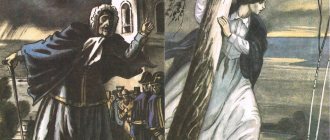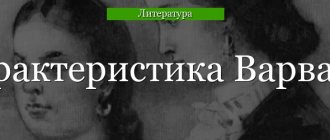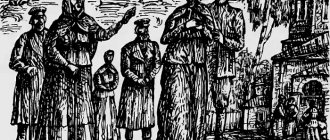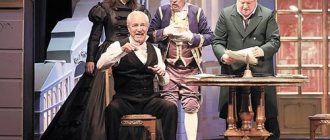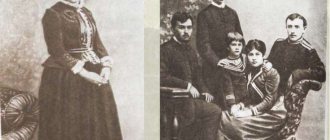Thunderstorm - Ostrovsky A.N.
Boris . Well, yes. Even now he sometimes says: “I have my own children, why would I give other people’s money? Through this I must offend my own people!”
Kuligin . So, sir, your business is bad.
Boris . If I were alone, it would be fine! I would give up everything and leave. I feel sorry for my sister. He was about to discharge her, but my mother’s relatives didn’t let her in, they wrote that she was sick. It’s scary to imagine what life would be like for her here.
Curly . Of course. They really understand the appeal!
Kuligin . How do you live with him, sir, in what position?
Boris . Yes, not at all. “Live,” he says, “with me, do what they tell you, and pay whatever you give.” That is, in a year he will give it up as he pleases.
Curly . He has such an establishment. With us, no one dares say a word about salary, he’ll scold you for what it’s worth. “Why do you know,” he says, “what I have in mind? How can you know my soul? Or maybe I’ll be in such a mood that I’ll give you five thousand.” So talk to him! Only in his entire life he had never been in such a position.
Kuligin . What to do, sir! We must try to please somehow.
Boris . That's the thing, Kuligin, it's absolutely impossible. Even their own people can’t please him; and where am I supposed to be?
Curly . Who will please him if his whole life is based on swearing? And most of all because of the money; Not a single calculation is complete without swearing. Another is happy to give up his own, just to calm down. And the trouble is, someone will make him angry in the morning! He picks on everyone all day long.
Boris . Every morning my aunt begs everyone with tears: “Fathers, don’t make me angry! Darlings, don’t make me angry!”
Curly . There's nothing you can do to protect yourself! I got to the market, that's the end! He will scold all the men. Even if you ask at a loss, you still won’t leave without scolding. And then he went for the whole day.
Shapkin . One word: warrior!
Curly . What a warrior!
Boris . But the trouble is when he is offended by such a person whom he does not dare to curse; stay home here!
Curly . Fathers! What a laugh it was! Once on the Volga, during a transport, a hussar cursed him. He worked miracles!
Boris . And what a homey feeling it was! After that, everyone hid in attics and closets for two weeks.
Kuligin . What is this? No way, have the people moved on from Vespers?
Several faces pass at the back of the stage.
Curly . Let's go, Shapkin, on a revelry! Why stand here?
They bow and leave.
Boris . Eh, Kuligin, it’s painfully difficult for me here, without the habit. Everyone looks at me somehow wildly, as if I’m superfluous here, as if I’m disturbing them. I don't know the customs here. I understand that all this is Russian, native, but I still can’t get used to it.
Kuligin . And you will never get used to it, sir.
Boris . From what?
Kuligin . Cruel morals, sir, in our city, cruel! In philistinism, sir, you will see nothing but rudeness and naked poverty. And we, sir, will never escape this crust! Because honest work will never earn us more than our daily bread. And whoever has money, sir, tries to enslave the poor so that he can make even more money from his free labors. Do you know what your uncle, Savel Prokofich, answered to the mayor? The peasants came to the mayor to complain that he would not disrespect any of them. The mayor began to tell him: “Listen,” he said, “Savel Prokofich, pay the men well! Every day they come to me with complaints!” Your uncle patted the mayor on the shoulder and said: “Is it worth it, your honor, for us to talk about such trifles! I have a lot of people every year; You understand this: I won’t pay them a penny extra per person, I make thousands out of this, that’s how it is; I feel good!” That's it, sir! And among themselves, sir, how they live! They undermine each other's trade, and not so much out of self-interest as out of envy. They are at enmity with each other; they get drunken clerks into their high mansions, such, sir, clerks that there is no human appearance on them, the human appearance is lost. And for small acts of kindness they scribble malicious slander against their neighbors on stamped sheets. And for them, sir, a trial and a case will begin, and there will be no end to the torment. They sue and sue here and go to the province, and there they are waiting for them and splashing their hands with joy. Soon the fairy tale is told, but not soon the deed is done; They lead them, they lead them, they drag them, they drag them, and they are also happy about this dragging, that’s all they need. “I’ll spend it,” he says, “and it won’t cost him a penny.” I wanted to depict all this in poetry...
Boris . Can you write poetry?
Kuligin . In the old-fashioned way, sir. I read a lot of Lomonosov, Derzhavin... Lomonosov was a sage, an explorer of nature... But he was also from ours, from a simple rank.
Boris . You would have written it. It would be interesting.
Kuligin . How is it possible, sir! They will eat you, swallow you alive. I already get enough, sir, for my chatter; I can’t, I like to spoil the conversation! I also wanted to tell you about family life, sir; yes some other time. And there is also something to listen to.
Feklusha and another woman enter
Feklusha . Blah-alepie, honey, blah-alepie! Wonderful beauty! What can I say! You live in the promised land! And the merchants are all pious people, adorned with many virtues! Generosity and many donations! I’m so pleased, so, mother, completely satisfied! For our failure to leave them even more bounties, and especially to the Kabanovs’ house.
They leave.
Boris . Kabanovs?
Kuligin . Prude, sir! He gives money to the poor, but completely eats up his family.
Silence.
If only I could find a mobile phone, sir!
Boris . What would you do?
Kuligin . Why, sir! After all, the British give a million; I would use all the money for society, for support. Jobs must be given to the philistines. Otherwise, you have hands, but nothing to work with.
Boris . Are you hoping to find a perpetuum mobile?
Kuligin . Absolutely, sir! If only now I could get some money from modeling. Farewell, sir! (Leaves.)
The fourth phenomenon
Boris (alone). It's a shame to disappoint him! What a good man! He dreams for himself and is happy. And I, apparently, will ruin my youth in this slum. I’m walking around completely devastated, and then there’s still this crazy thing creeping into my head! Well, what's the point! Should I really start tenderness? Driven, downtrodden, and then foolishly decided to fall in love. Who? A woman with whom you will never even be able to talk! (Silence.) Still, she’s out of my head, no matter what you want. Here she is! She goes with her husband, and her mother-in-law with them! Well, am I not a fool? Look around the corner and go home. (Leaves.)
Essay on the topic: “The Dark Kingdom” in A. N. Ostrovsky’s drama “The Thunderstorm”: Wild and Kabanikha
Composition. “The Dark Kingdom” in A. N. Ostrovsky’s drama “The Thunderstorm”: Wild and Kabanikha
Autumn 1859. Premiere at the Moscow Maly Theater. Great actors play a play by a great playwright. Treatises will be written about this work, and N. Dobrolyubov and A. Grigoriev will come together in polemics about it. This play will take place on many stages around the world, but all this will happen later, but for now the Maly Theater is staging A. N. Ostrovsky’s new play “The Thunderstorm” for the first time. Behind the rising curtain is a panorama of the Volga, in the foreground are trees and benches. The action takes place in the city of Kalinov, surrounded by green gardens. “The view is extraordinary! Beauty! The soul rejoices!” - these words of Kuligin are a kind of prologue to the play. It seems that against the backdrop of such beauty, people should live beautifully and happily. However, it is not. In Kalinov there is an atmosphere of “dull aching pain..., prison deathly silence.” “Dark Kingdom” - this is the description given to many residents of the city of Kuligin. He criticizes Kalinov’s “cruel morals”, the rudeness and deceit of its inhabitants. Indeed, one gets the impression that in Kalinov everything has been turned upside down, everything has lost its meaning. Kindness here has become a cover for anger and cruelty. Let us remember how the same Kuligin characterizes Kabanikha: “Prudence! He gives money to the poor, but completely eats up his family.” Love in this city is a crime. Any manifestation of sincere feeling is regarded as a sin. When Katerina, saying goodbye to Tikhon, throws herself on his neck, Kabanikha pulls her back: “Why are you hanging on your neck, shameless one! You are not saying goodbye to your lover! He’s your husband, your boss!” Love and marriage cannot live together here. In the Kabanov family, rudeness and deception reign, but not love. Marfa Ignatievna remembers love only when she needs to justify her cruelty: “After all, parents are strict with you out of love... Well, I don’t like that now.” Even Katerina’s death will not make Kabanikha’s cold heart shrink: “It’s a sin to cry about her!” I think Kabanikha is smart. Ignorant, considering the locomotive a “fiery serpent”, captivated by the stories of wandering praying mantises about countries where “Saltans” rule, and people are all “dog-headed”, she is still able to appreciate what is happening. Kabanikha understands that money does not yet give complete power, she needs to enslave people, desecrating in them all the best that is in every decent person: love, loyalty, a sense of beauty, faith, finally. The main means for achieving complete dominion over people is cruelty, disguised as hypocrisy. But Kabanikha’s cruelty bears bitter fruit: Katerina dies, Varvara runs away from home, Tikhon reproaches his mother for the first time, accusing her of his wife’s death. Such a conclusion is easily drawn by the viewer or reader, but it is inaccessible to the merchant herself, because it goes beyond the rules that reign in the “dark kingdom.” Kabanikha, in my opinion, is the most consistent defender of this kingdom, because she has a presentiment of its death: “The old man is being deduced... What will happen, how the old people will die, how the light will last, I don’t know... it’s good that I won’t see anything.” . I think that with this feeling of the end of the way of life that was characteristic of the Russian merchants of the mid-19th century, Marfa Ignatievna differs from Dikiy, the richest man in Kalinov (it is noteworthy that he is named first in the list of characters). This “shrill man” firmly believes that money has given him a free hand in communicating with people. If Kabanikha acts “under the guise of piety,” then this tyrant of the day cannot live without swearing. For him, a person is a worm: “If I want, I’ll have mercy, if I want, I’ll crush.” Is it any wonder that Dikoy deliberately commits a crime, ruining hired workers. “I won’t pay them a penny extra per person, but this makes up thousands,” he says to the mayor, who treats Dikiy’s revelations quite calmly, because he himself depends on him. This is who is at the head of Kalinov! Dikiy's inertia and rudeness are manifested in his conversation with Kuligin. Savel Prokofievich does not want to know either about scientific discoveries or about Derzhavin. Thus, in the “dark kingdom” not only high feelings perish, but also any manifestations of creative thought. However, Dikoy fights only with those who depend on him. When a hussar scolded him at the crossing, this militant tyrant did not dare to confront the officer, but took out all his anger on his family. “You’ve been fighting with women all your life,” Kabanikha reproaches him. And Kuligin characterizes the meaning of life in the “dark kingdom” this way: “To rob orphans, relatives, nephews, to kill the family.” How terrible are people who have chosen cruelty as the main business of their lives! Dikoy and Kabanikha are similar in many ways: to strangle, destroy nobility, feelings that are not similar to silent obedience, to mock people who are submissive to their power - this is for them, if not the meaning of life, then no small pleasure. But Kabanikha came to this through her “hard labor”. She was just as broken and abused in her husband’s house. All this stopped for her only after she became the absolute mistress of the house. And this could only happen after the death of the previous owners. This means that this is the order in life: endure while the master is standing over you, enjoy impunity, since you yourself have become the mistress. It doesn’t even occur to her that this order can be changed, that she can treat her son, daughter-in-law, and daughter differently, with love and tenderness. There are no such concepts in her soul. She endured - let others endure too. But Kabanikha, not only strong in character, but also unprincipled and indifferent, does not understand something else: a person can not only be broken, like Tikhon, embittered, like Varvara, but can simply be destroyed physically, if the directness of character and the tenderness of the soul cannot be overcome. This is what happened to Katerina. It's much easier for the wild one. He does what his father, grandfather, and neighbor have done all his life. The difference is that there is more money, but less and less intelligence. After all, Dikoy doesn’t even live by the principle: money will buy everything. He doesn't want to buy anything. And why, when you can use the power of money as a battering ram, as a trap, simply as force. The “pious wanderer” Feklusha sets off the characters of Kabanikha and Dikiy in her own way. She doesn’t just bring information about the big world to Kalinov. She justifies the life principles of the “dark kingdom”, and the characteristics of the city and its inhabitants in her mouth are no less ridiculous than the stories about overseas “Saltans”. Kalinov becomes a “promised land” for her, and the cruel Kabanikha becomes a model of piety. This is yet another confirmation of the meaninglessness and futility of the “dark kingdom.” “The Thunderstorm” is the best, but not the only play by A. N. Ostrovsky, which exposes the cruel morals of the powerful. Let’s remember “Dowry Girl,” “Profitable Place,” “Mad Money” and other plays. In 1886, Ostrovsky, having made his last trip to the Volga, according to his contemporaries, “fell ill at heart”: nothing had changed in Russia. The great playwright decided to start writing a new play for his beloved Maly Theater. However, death crossed out this plan.

